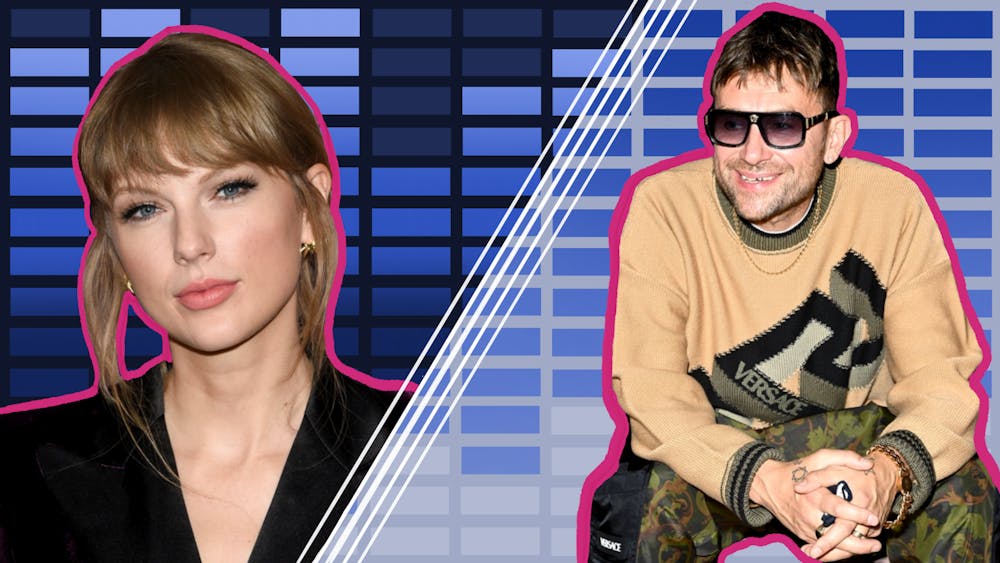Much like writing a book or directing a movie, crafting a flawless song is a complex, collaborative effort. What we hear and perceive as music goes through many rounds of editing until perfection, which makes it easy for listeners to ignore all the steps necessary to get to the final product. Although we immediately recognize the main vocalist—your Justin Bieber's, Ariana Grande's, and Beyoncé's—and the instrumental accompaniment of a song, the co–writers, producers, and vocal engineers behind the scenes can go unnoticed. Their legacy lies in small print on the credits page, just another name that only the most passionate music connoisseurs would pay attention to.
For most artists who put so much hard work into their music, these distinct levels of recognition are important. Today’s biggest hits almost always feature the lead’s name as a songwriter, acknowledging their role in the track’s development. This label can be especially helpful for young musicians, whose dreams of getting signed by a record company can become true if they show promise in their self–penned songs. Part of Olivia Rodrigo's and Billie Eilish’s sudden rises to stardom can be attributed in large part to their marketing as relatable, honest, and down–to–earth writers.
Thus, questioning this well–deserved title is equivalent to belittling one’s artistry. In an interview with The Los Angeles Times, Gorillaz frontman Damon Albarn shaded Taylor Swift by denying her abilities as a writer. When the interviewer acknowledged that “Swift is an excellent songwriter,” Albarn’s main argument was that Swift “doesn’t write her own songs” because she’s a “songwriter who co–writes.” He further clarified by praising Eilish’s writing and calling it more “minor and odd.” Already, Albarn’s point falls flat because Eilish often collaborates with her older brother FINNEAS on her albums. Even more preposterous, however, is Albarn’s direct criticism of Swift. As evidenced by many of her peers who publicly defended her, Swift clearly has a hand in the writing process.
Swift herself fired back at Albarn’s comments, saying that “it’s really fucked up to try and discredit my writing.” For another artist, Albarn’s attack might have been career–ending. But Swift is no stranger to these remarks, which are often rooted in misogyny. Swift was first criticized for not writing her music after her breakthrough with Fearless, so she wrote her next album, Speak Now, completely by herself. After being accused of writing too many songs about her exes, Swift released folklore and evermore, albums that are more diverse and adventurous in their storytelling.
Behind the drama between two of the music industry’s most influential figures is a deeper battle for fair recognition. Albarn’s statement is mostly inaccurate, although he does make an important distinction. When Albarn calls Swift a “songwriter who co–writes” rather than just a “songwriter,” he’s referring to the thousands of legitimate musicians signed with label companies who have relatively little solo music released. Rather than following the path of pop stardom, these artists are furiously working behind the scenes, crafting the catchiest melodies and most memorable lines in today’s Top 40 hits. They're people like Victoria Monét and Emily Warren, two songwriters who supported a petition for artists to stop receiving publishing credits when they “did not contribute to the composition in any way.” When Spotify and Apple Music already underpay their clientele, ghostwriters can be completely cut off from the revenue conversation, making their work seem insignificant.
It’s easy, then, to disregard most popular songs as inauthentic at best and and plagiarized at worst in the context of an artist’s discography. But there’s a fine line between stealing from others and participating in the music–making process. These artists still have substantial creative input, and there’s more to music than just writing. For example, consider Dua Lipa’s “Levitating,” 2021’s most consumed song. “Levitating” was co–written by Sarah Hudson, the mastermind behind other hits like Katy Perry’s “Dark Horse” and Iggy Azalea’s “Black Widow,” but the success of the track is not solely due to Hudson’s efforts. Lipa’s stunning performances, in tandem with her constant reworking of the infectious melody, require a strong understanding of music’s most integral concepts. Rather than dividing our attention between a songwriter or a songwriter who co–writes, we should be celebrating everyone’s artistic visions that combine to make a song so great.
Music, more than anything else, is a collaborative work of art. Every writer, producer, note, and word has its own special role in bringing a collection of cluttered sound waves to life. Albarn’s remark is damaging not only to Swift but also to all the musicians fighting for appreciation of their hard work. When it comes to creating a song, there’s no such thing as an unnecessary role. Each contributor deserves to be called a musician, because they've all played their part in our enjoyment and experience of the music we listen to.







